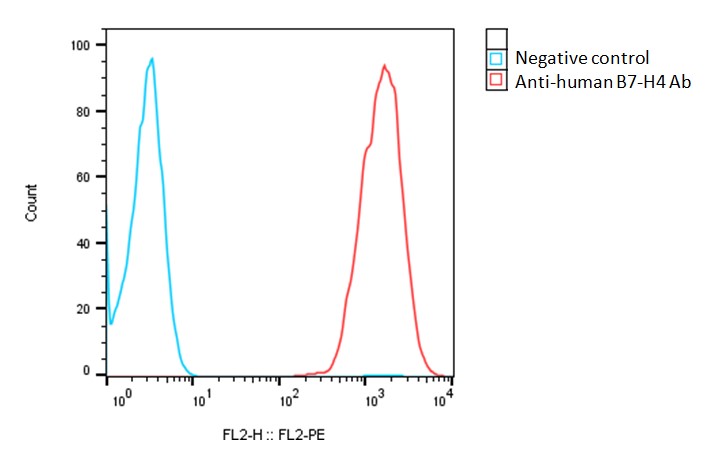
| Catalog Number | Product | Size | Price | |
|---|---|---|---|---|
| C3019 | Human B7-H4-CHO-K1 Stable Cell Line | 2 vials | $3950 | Order |
| Catalog Number | C3019 |
|---|---|
| Cell Line Name | Human B7-H4-CHO-K1 Stable Cell Line |
| Accession Number | KAI2518609.1 |
| Host Cell | Adherent CHO-K1 |
| Quantity | Two vials of frozen cells (1x106 per vial) |
| Culture Medium | DMEM with 10% FBS, 4 µg/ml puromycin |
| Freezing Medium | 90% FBS and 10% DMSO |
| Storage | Liquid nitrogen upon receipt |
| Product Datasheet: | Download PDF |
Detection of human B7-H4 expression on human B7-H4-CHO-K1 stable cells using an anti-human B7-H4 monoclonal antibody, followed by staining with PE-anti-mouseIgG antibody.

B7-H4, also known as VTCN1 (V-set domain-containing T-cell activation inhibitor 1, B7X, B7H4, and B7S1), belongs to the B7 family of immune regulatory proteins expressed on the surface of antigen-presenting cells (APCs), such as dendritic cells, macrophages, and B cells. Its expression is induced by pro-inflammatory cytokines and can be upregulated in response to immune activation. The main function of B7-H4 is to negatively regulate T-cell-mediated immune responses by inhibiting the proliferation, cytokine secretion, and cell cycle of T cells. B7-H4 expression has been observed in various tumor types, including breast, ovarian, lung, gastric, and pancreatic cancers. Its upregulation in these tumors has been associated with poor prognosis and reduced patient survival. The overexpression of B7-H4 in cancer cells is thought to contribute to immune evasion by suppressing the anti-tumor immune response.
Wang, Jia-Yu, and Wei-Peng Wang. B7-H4, a promising target for immunotherapy.” Cellular immunology. 347:104008. 2020.
Zang, Xingxing et al. “B7x: a widely expressed B7 family member that inhibits T cell activation.” Proceedings of the National Academy of Sciences of the United States of America. 100,18: 10388-92. 2003.
Tringler, Barbara et al. B7-h4 is highly expressed in ductal and lobular breast cancer. Clinical Cancer Research. 5: 1842-8. 2005.